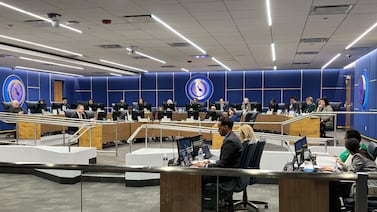Sign up for Chalkbeat Newark’s free newsletter to get the latest news about the city’s public school system delivered to your inbox.
Public school superintendents warned state lawmakers that any cuts President Donald Trump’s administration makes to the U.S. Department of Education will hurt marginalized students the most.
New Jersey schools are funded by property taxes, with most money coming from the state and local taxes and a smaller portion coming from the federal government. In the 2020-21 school year, just 5.3% of education revenue in New Jersey came from the federal government, according to data from the National Center for Education Statistics.
Trump said he plans to dismantle the federal education department, which could lead to a decrease in federal funding for New Jersey schools. His exact plans are not clear, and he would need support from Congress to eliminate the department entirely.
“Our hope is that none of this will come to pass and the people in Washington will work to improve the federal D.O.E. and not tear it apart in a way that will be both confusing and concerning for the school leaders of the state, as well as possibly negatively affecting our students and their families,” said Melanie Schulz, director of government relations for the New Jersey Association of School Administrators, at a Joint Committee on the Public Schools meeting in Trenton on Tuesday.
Superintendents who testified Tuesday described the federal education department as a civil rights organization that distributes funding to students who need it most, such as those with disabilities, multilingual learners, and students in high-poverty school districts. They urged the state Department of Education to step in to meet students’ needs if cuts do happen.
“Historically marginalized students are the ones who’ll be the most impacted by the loss of federal funding,” said Scott Feder, superintendent of the South Brunswick School District. “The kind of money we’re talking about is not replaceable unless the state of New Jersey is going to fork up probably between 800 [million] to a billion [dollars].”
Loss of federal funding could put key programs at risk
Feder said if federal funding gets cut, the question becomes, does New Jersey still want to continue the programs that were federally funded?
About 3%, or $5 million, of South Brunswick’s budget is federal money. If the district were to lose that, its only option would be to cut $5 million worth of programs and services, which is equal to cutting 70 teachers, Feder said.
“If we stay flat — no new state aid, no new federal funding, nothing else — and we maximize the tax levy impact, most districts will be down somewhere between 2 and 4% of their operating budgets” for the next school year, Feder said, since most districts can only raise their property taxes by 2%, which is less than the cost increase for goods and services districts expect for the next school year.
South Brunswick district would be down by about $3 million in the next school year’s budget if all funding remains flat, Feder said. The loss could be as great as $8 million if federal funding is cut.
Hope Grant, assistant superintendent in the Trenton Public School District, said federal funding levels the playing field for school districts like Trenton, which has one of the highest poverty rates in New Jersey.
Grant said many of the district’s students start at a disadvantage before they enter school, whether it is due to a lack of prenatal care, limited access to books, or other reasons. Federal Title I funding, which is for high-poverty districts, helps students catch up by providing mental health support, high-impact tutoring, and learning opportunities before and after school and on the weekends, she added.
The district receives federal funding for universal free and reduced-cost lunch, guaranteeing that all students have at least one meal a day.
“Without those dollars, we are now saying that your ability to have breakfast and lunch is a privilege, and our children should not have to see breakfast and lunch as a privilege. That should be a right that is embedded in every single student in our district, in our city,” Grant said.
Trenton also uses federal funding for its program to combat chronic absenteeism, which is when students miss 10% or more of the school year. Under the program last year, nearly 600 in-person meetings were held with families to help improve attendance rates.
Kelli Eppley, assistant superintendent for the Manville School District, said only 1% of the district’s budget comes from federal funding, but it makes a big difference in efforts to close achievement gaps between the highest- and lowest-performing students. Manville used Title I funding to offer summer school and tutoring for students, 85% of whom showed accelerated growth while participating.
“The loss of these funds would create significant gaps in the services our students depend on, further widening the achievement gap,” Eppley said. “These programs will end if we lose our funding.”
Special education programs ‘would be compromised’
Julie Borst, executive director of Save Our Schools New Jersey, noted that while funding for the Individuals with Disabilities Education Act is supposed to cover 40% of the cost of educating students with disabilities, it has never funded more than 17%. In 2024, federal funding covered just 14.7% of the costs, she said.
Superintendents and school business administrators who testified said it is already hard to fund special education, and warned cuts to IDEA would require districts to direct more money from general education programs to special education.
Kara Huber, school business administrator for the Lenape Regional High School District, said her district has a larger percentage of special education students than the census average that is used for determining state special education aid in New Jersey. She said the district is not funded for 167 students who receive special education services.
Lenape Regional High School District receives $1.5 million in IDEA funding.
“Without the essential support, our ability to provide the required services for our special education students would be compromised, placing even more of a burden on our general education programs,” Huber said. “The only way that we make up those funds is by taking away from essentially our general education.”
Cuts could also impact the resources available for career and technical education in the state, said Jackie Burke, executive director of the Council of County Vocational-Technical Schools. The federal government gave the state Department of Education $29 million in fiscal year 2025. This money is used to pay for industry-standard equipment, such as industrial ovens for culinary programs and laser welders for welding programs.
“Loss of this aid does not solely affect schools. It would also be detrimental to the many businesses and employers who rely on the education and technical training our students receive to fill positions that allow them to continue to grow and operate in our school, thereby meeting the economic demands of the state,” Burke said.
Hannah Gross covers education and child welfare for NJ Spotlight News via a partnership with Report for America. She covers the full spectrum of education and children’s services in New Jersey and looks especially through the lens of equity and opportunity. This story was first published on NJ Spotlight News, a content partner of Chalkbeat Newark.





